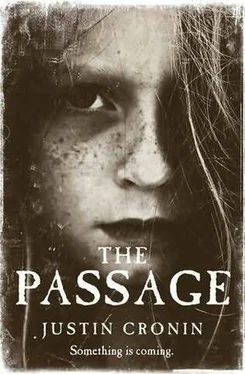“Don’t you want to know what he did?”
Wolgast shrugged. He was in no hurry, but now was as good a time as any.
Doyle slurped his latte and read: “Anthony Lloyd Carter. African American, five foot four, a hundred and twenty pounds.” Doyle looked up. “That explains the nickname. Take a guess.”
Already Wolgast felt tired. “You’ve got me. Little Anthony?”
“You’re showing your age, boss. It’s T-Tone. T for ‘Tiny,’ I’m thinking, though you never know. Mother deceased, no dad in the picture from day one, a series of foster homes care of the county. Bad beginnings all around. A list of priors but mostly petty stuff, panhandling, public nuisance, that kind of thing. So, the story. Our man Anthony cuts this lady’s lawn every week. Her name is Rachel Wood, she lives in River Oaks, two little girls, husband’s some big lawyer. All the charity balls, the benefits, the country clubs. Anthony Carter is her project . Starts cutting her lawn one day when she sees him standing under an overpass with a sign that says, HUNGRY, PLEASE HELP. Words along those lines. Anyway, she takes him home, makes him a sandwich, puts in some calls and finds him a place, some kind of group home she raises money for. Then she calls all her friends in River Oaks and says, Let’s help this guy, what do you need done around the place? All of a sudden she’s a regular Girl Scout, rallying the troops. So the guy starts cutting all their lawns, pruning the hedges, you know, all the things they need around the big houses. This goes on about two years. Everything’s hunky-dory until one day, our man Anthony comes over to cut the lawn, and one of the little girls is home sick from school. She’s five. Mom’s on the phone or doing something, the little girl goes out into the yard, sees Anthony. She knows who he is, she’s seen him plenty of times, but this time something goes wrong. He frightens her. There’s some stuff here about maybe he touched her, but the court psychiatrist is iffy on that. Anyway, the girl starts screaming, Mom comes tearing out of the house, she’s screaming, everybody’s screaming, all of a sudden it’s like a screaming contest, the goddamn screaming Olympics. One minute he’s the nice man who shows up on time to cut the lawn, next thing you know, he’s just a black guy with your kid, and all the Mother Teresa shit goes out the window. It gets physical. There’s a struggle. Mom somehow falls or gets pushed into the pool. Anthony goes in after her, maybe to help her, but she’s still screaming at him, fights him off. So now everybody’s wet and yelling and thrashing around.” Doyle looked at him quizzically. “Know how it ends?”
“He drowns her?”
“Bingo. Right there, right in front of the little girl. A neighbor heard it all and called the cops, so when they get there, he’s still sitting on the edge of the pool, the lady floating in it.” He shook his head. “Not a pretty picture.”
Sometimes it was troubling to Wolgast, how much energy Doyle put into these stories. “Any chance it was an accident?”
“As it happens, the victim was on the varsity swim team at SMU. Still did fifty laps every morning. The prosecution made a lot of hay with that little detail. That and the fact that Carter pretty much admitted to killing her.”
“What did he say when they arrested him?”
Doyle shrugged. “He only wanted her to stop screaming. Then he asked for a glass of iced tea.”
Wolgast shook his head. The stories were always bad, but it was the little details that got to him. A glass of iced tea. Sweet Jesus. “How old did you say he was?”
Doyle flipped back a couple of pages. “I didn’t. Thirty-two. Twenty-eight at the time he went into custody. And here’s the thing. No relatives at all. Last time anybody came to see him in Polunsky was the victim’s husband, a little over two years ago. His lawyer left the state, too, after the appeal was turned down. Carter’s been reassigned to somebody else in the Harris County PD office, but they haven’t even opened the paperwork. Ipso facto, nobody’s watching the store. Anthony Carter goes to the needle on June second for murder one with depraved indifference, and not one soul on earth is paying attention. The guy’s a ghost already .”
The drive to Livingston took ninety minutes, the last fifteen minutes on a farm-to-market road that carried them through the intermittent shade of piney woods and open fields of prairie grass spangled with blue-bonnets. It was just noon; with luck, Wolgast thought, they could be done by dinner, enough time to drive back to Houston and dump the rental and get on a plane to Colorado. It was better when these trips were quick like that; when he lingered too long, if the guy was hemming and hawing and drawing it out-never mind that they always took the deal eventually-he’d start to get a queasy feeling in his stomach about the whole thing. It always made him think of a play he’d read in high school, The Devil and Daniel Webster , and how he, Wolgast, was the devil in this deal. Doyle was different; he was younger, for starters, not even thirty, a cherry-cheeked farmboy from Indiana who was glad to play Robin to Wolgast’s Batman, calling him “chief” and “boss,” with a streak of old-fashioned midwestern patriotism so unalloyed that Wolgast had actually seen him tear up at the national anthem at the start of a Rockies game-a game on TV. Wolgast hadn’t known they still made people like Phil Doyle. And there was no question Doyle was smart, with a good future ahead of him. Fresh out of Purdue, his law school applications already in the works, Doyle had joined the Bureau right after the Mall of America Massacre-three hundred holiday shoppers gunned down by Iranian jihadists, all the horror captured by security cameras to be replayed in painstakingly gruesome detail on CNN; it seemed like half the country was ready to sign on to something, anything that day-and after finishing his training at Quantico, he had been posted to the Denver field office, assigned to counterterrorism. When the Army had come looking for two field agents, Doyle had been the first in line to volunteer. Wolgast couldn’t quite figure that; on paper, what they were calling “Project NOAH” had looked like a dead end, and Wolgast had taken the assignment for just that reason. His divorce had just come through-his marriage to Lila hadn’t ended so much as evaporated, so it had taken him by surprise, how blue the actual decree had made him-and a few months of travel seemed like just the thing to clear his mind. He’d gotten a small settlement in the divorce-his share of the equity in their house in Cherry Creek, plus a piece of Lila’s retirement account from the hospital-and he’d actually thought about quitting the Bureau entirely, going back to Oregon and using the money to open up a small business of some kind: hardware, maybe, or sporting goods, not that he knew anything about either one. Guys who quit the Bureau always ended up in security, but to Wolgast the idea of a small store, something simple and clean, the shelves stocked with baseball gloves or hammers, objects with a purpose you could identify just by looking at them, was far more appealing. And the NOAH thing had seemed like a cakewalk, not a bad way to spend his last year in the Bureau if it came to that.
Of course, it had turned out to be more than paperwork and babysitting, a lot more, and he wondered if Doyle had somehow known this.
At Polunsky they were ID’d and asked to check their weapons, then went to the warden’s office. Polunsky was a grim place, but they all were. While they waited, Wolgast used his handheld to check for evening flights out of Houston-there was one at 8:30, so if they hustled they could make it. Doyle said nothing, just flipped through a copy of Sports Illustrated , like he was waiting at the dentist. It was just after one when the secretary led them in.
Читать дальше












